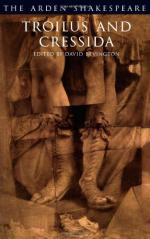|
This section contains 7,591 words (approx. 26 pages at 300 words per page) |

|
SOURCE: Barfoot, C. C. “Troilus and Cressida: ‘Praise Us As We Are Tasted.’” Shakespeare Quarterly 39, no. 1 (spring 1988): 45-57.
In the following essay, Barfoot examines the human relationships in Troilus and Cressida in relation to the “mercantile metaphor” that runs throughout the play. This metaphor, the critic contends, “suggests that we are all traders in our relationships, and, as victims and perpetrators, susceptible to the inevitable treachery that trade brings in its wake.”
In his famous outburst towards the end of the harrowing scene in which he observes Cressida seducing Diomedes (or allowing herself to be seduced by him), Troilus shifts violently from a faith or belief in “rule in unity” to a recognition of the need henceforth to live with “bifold authority.”1 In this speech Troilus's experience as a lover is brought into line with the experience of others in the play as warriors: that is, “wars and...
|
This section contains 7,591 words (approx. 26 pages at 300 words per page) |

|


